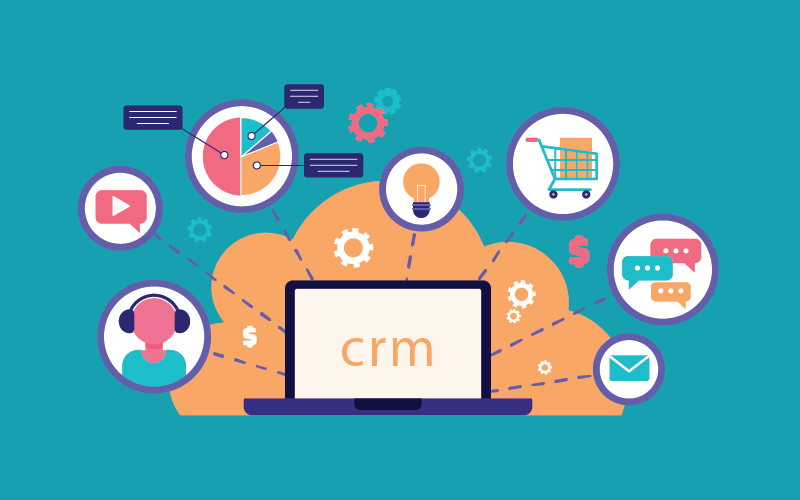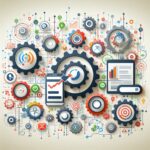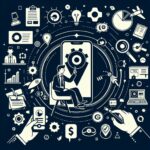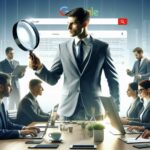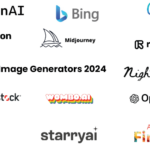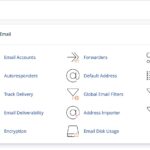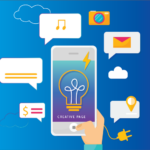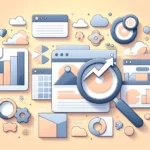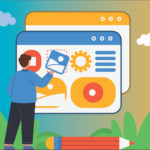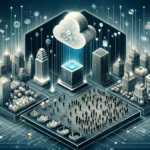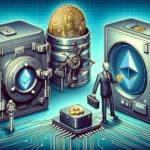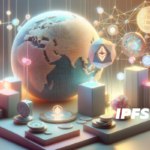CRM and ERP are solutions that both aim to help with customer service. They’re different in what they offer since CRM offers a more personalized, one-on-one customer service whereas ERP is for managing the database of all your customers.
Companies that want to streamline their day-to-day operations usually turn to enterprise resource planning and customer relationship management. ERP and CRM go really well together. The CRM system lets your customers interact consistently with your business and keep track of their preferences, while with the ERP you can manage all of your company’s financial information in one place.
Both sources of data cross more than one department and are even sometimes built on the same platform – one is often bought separately & integrated with the other afterwards. This article will help you identify the key differences between ERP and CRM. You’ll also find out if your business needs one or both of these systems.
What is CRM?
Customer relationship management is all about managing the customer’s relationships with the business that they love. Early versions of CRM systems were for sales departments and were known as sales force automation (SFA). As the telephone became used more in customer service, some systems were designed to deal only with that, such as contact centres.
Programs that help you manage your customer relationships have evolved a lot. Sales performance management and sales incentives are often included in CRM systems. But they’re often sold separately and come with a separate cost because they’re quite complex.
What is ERP?
ERP is a plan that helps a company manage all the resources it needs to operate successfully. MRP was the first of many systems designed to help manufacturers understand what they need. A general ledger is a centralized database containing all financial operations in an organization and sorts according to the cash flow. Accounts receivable, accounts payable, payroll and financial reporting are all housed within the GL.
But ERP also extends to inventory management, manufacturing, and supply chain management. In addition to that, it includes data about service companies. ERP helps manage procurement, production, distribution and fulfilment. Some ERPs also offer HRMS, CRM and eCommerce.
CRM Benefits
CRM software acts as a centralized repository for all customer information so you can keep track of transactions and interactions with your customers. That way, you can make better decisions about how to handle their needs. For example, knowing which customers are your most profitable, what needs to be done to keep them happy, and much more.
An example of AI in the workplace is a sales rep that relies on their CRM to know if any customer service tickets need to be addressed. Companies can use AI to answer customer questions before they even have a chance to ask them. Similarly, Customer Service agents can quickly figure out who is likely going to be a high-value customer, and prioritize their service accordingly.
ERP Benefits
You can get a lot of benefits from an ERP. You’re gonna have a single database for all data, so reporting wise it’s much easier. Plus ad hoc reports that leadership requests can also be quickly answered with this service. When you have access to a single source of data, it’s easier for employees to identify financial insights. They don’t need IT/finance teams to do the analysis & reporting for them. This allows businesses to make faster, data-backed decisions that have a positive impact on different parts of their business, like profits and efficiency.
One great advantage of ERP software is that you can close the books much more often. It’s a lot easier to account for everything at the end of each month or even quarter. Typically this requires a handful of manual tasks and updating data, with some contact with customers. With a centralized ERP system automating much of the work, companies have been reporting reductions in monthly closing time. For example, closing time may now take only one week.
ERP systems also provide much-needed financial control throughout your organization. This is achieved through a centralized system and role-based permissions, so only those with the correct job function will see sensitive data. The built-in audit trail means your finances are always under control.
What is the Difference Between CRM and ERP?
Depending on your business, you may need to rely on two different types of business software – ERP and CRM. They’re both very useful in their own ways but do different things. Basically, ERP handles your finances while CRM is all about leveraging customer relationships to grow your business. The back office is where you do most of your work and the front office is all about interacting with customers.
When choosing the right ERP for your company, consider the CRM component. Just because an ERP does not have a built-in CRM doesn’t mean you can’t get one separately. For instance, if Salesforce was included in an ERP package and didn’t have a way to interact with customers that would be a major red flag.
How are CRM and ERP Similar?
ERP and CRM are business applications that use a relational database to store data & analyze it. One benefit of SaaS is that it requires less up-front capital. With an on-premises model, you have to invest in expensive computers or software upfront.
NetSuite is the pioneer SaaS EVP and CRM respectively but their climb to the top was smoother because at first, businesses weren’t so keen on cloud-based technology.
Do I need CRM or ERP or both? Which option do I choose?
More and more SMBs are starting to realize that they need both ERP and CRM systems. Merging these two platforms together into one product is a way for companies to save time and effort- I think it’s something worth considering. All growing businesses- be they SMBs or enterprise-level companies- will eventually need both ERP and CRM systems. This is why many folks are choosing to integrate their ERP and CRM solutions into one platform. Entry-level accounting tools are a good option for small ‘mom and pop’ type shops but as your business needs change, you should look into more robust or sophisticated options.
If you want to save time and effort, start by investing in CRM. It doesn’t matter where you put it in your workflow – what matters is that a CRM system is the first thing on your business must-haves list. A company with a small set of high-value customers and complex financials might be more apt to first invest in an ERP system before investing in CRM because their return on investment would be higher. In addition, companies that are straightforward and have a large number of customers may want to start CRM first. Ultimately, both systems are important for most companies.
Key Features of ERP vs. CRM
- ERPCRMFinancial Management
- AccountingSales Force Automation
- Order ManagementCustomer Service
- Contact CenterProduction Management
- Marketing Automation
- Supply Chain Management
- Customer Self-Service
- Warehouse Management and Fulfillment
- Inventory Management
Adopt a Solution That Unifies ERP and CRM
A lot of companies use an ERP, but there’s a module they should consider next. A CRM will improve the way customers can reach out and interact with your company. It works to provide a comprehensive view of the company’s cash flow and what resources are available, while also giving other stakeholders a clear picture of the business’s progress.
ERP systems with CRM built in can offer a lot of benefits. Unified ERP and CRM systems are cheaper to purchase than point solutions individually, and the unified data model means you’ll never have to wait for a batch upload or spend time on complex integration. ERP systems that are built from the ground up are a better choice for transactional processes. That means you don’t have to spend as much time doing customizations or coding, can rely on third-party tools and can more easily address the needs of your business.

